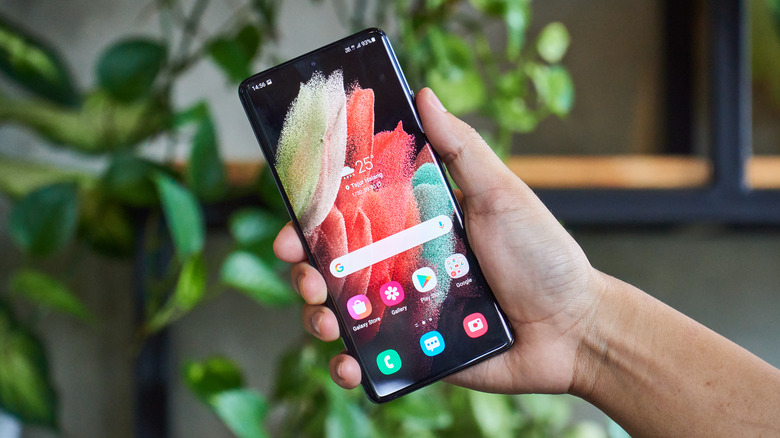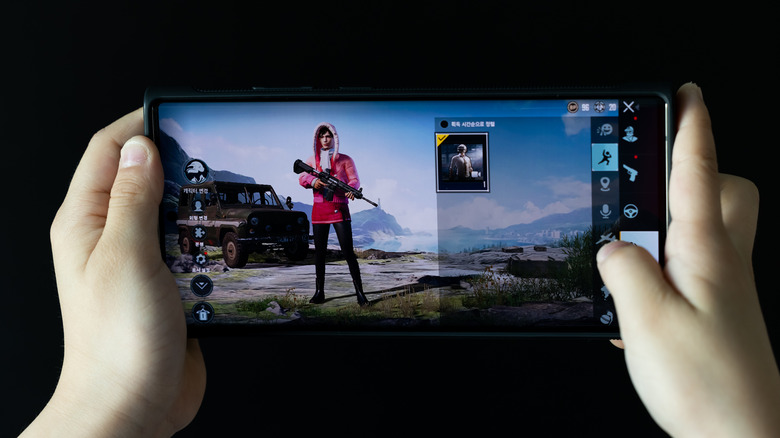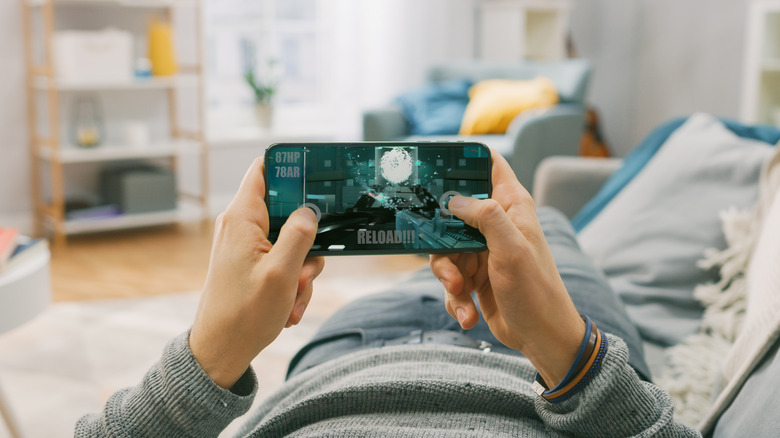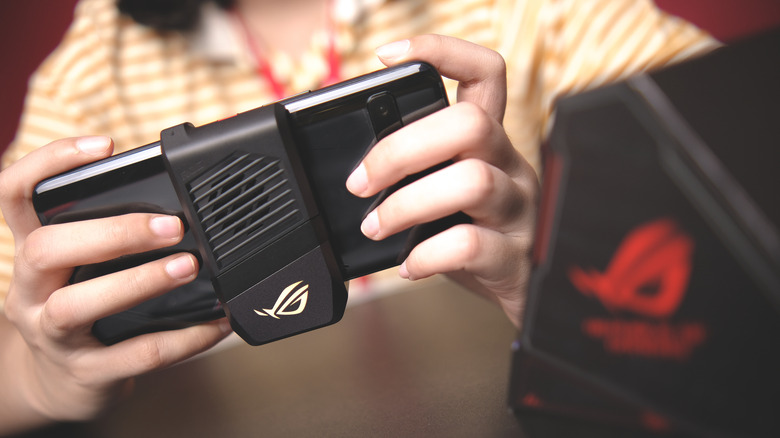5 Reasons To Get A Gaming Phone And 5 Reasons Not To
We may receive a commission on purchases made from links.
Here's some good news for all the gamers out there. According to a study by Australian and Chinese researchers, playing games can increase a person's grey matter and lead to better brain connectivity. In other words, playing games is actually good for you and makes you smarter.
The same can't be said for social media, which most people use their smartphones for, however. So, why not flip the script, so to speak, and get a gaming phone for school, your daily commute to work, or just because?
We play games at home already, and we have our smartphones with us pretty much wherever we go nowadays, so why not take games with us, and improve the mobile gaming experience, by getting a dedicated gaming phone — thus ensuring hours of entertainment? You have surely thought of it at some point, am I right?
Getting a dedicated gaming phone sounds good on paper, but how does the reality stack up? If you are serious about your mobile games, and if you don't want to settle for anything less than the highest frame rates, crispest graphics, and longest battery life, then a gaming phone is a must-have item — that's a given.
Here are five reasons to get a gaming phone, along with five reasons to save some money and opt for a flagship phone for playing games instead.
Better battery life
Gaming phones almost universally feature a big, beefy battery, which is a welcome perk for all gamers. Having a much bigger battery compared to the average phone, of course, means much better battery life, which means longer gaming sessions, which leads to prolonged escapist bliss, happiness, good times for gamers, and if the aforementioned article is to be believed, increased grey matter as well. Win-win all around, so from the angle of battery life, gaming phones are a no-brainer. Having a bigger battery is always a great feature to have in any phone, but especially in ones targeting the gaming crowd.
Gaming smartphones, like the ASUS ROG Phone 5 and the Nubia RedMagic 7, have high-capacity batteries that won't drain as fast as standard smartphones while playing games. Still, there are several mainstream smartphones that can go toe-to-toe with gaming phones when it comes to battery life, as we found that both the iPhone 13 Pro and 13 Pro Max have batteries that last all day without a top-up.
Better performance
"But can it run Crysis?" is the measuring stick by which all gaming hardware is analyzed nowadays. Where most smartphones struggle with its demands, a dedicated gaming phone hardly breaks a sweat. Running a game and it being playable on the device with consistent frame rates are two very different things, indeed.
One of the most compelling reasons to get a dedicated gaming phone is that each features top-of-the-line specialized hardware (such as haptic triggers), boosts in RAM, and/or the most powerful CPU or GPU configurations available, in addition to incredible screens such as the 6.8in 165Hz OLED display on the Red Magic 7. Some have dedicated cooling systems such as the Twin Turbo-Fan Cooling system on the Lenovo Legion Phone Duel 2. Not to mention a plethora of add-ons to give the user the smoothest mobile gaming experience imaginable (via Techradar). From the technical side, these phones are certainly capable of running Crysis (or others like it) in style — though it can still be rough since the game isn't optimized for mobile hardware.
Most games from the official app store, such as Fortnite, Call of Duty, or PUBG, run like a dream on these phones.
Regular apps run better as well. More RAM means better performance when you're watching or editing a video, loading intensive apps faster, or being able to smoothly run more apps simultaneously without home-screen lag. Developers can get away with less software optimization, which is a costly and time-intensive process.
Refresh rate
The refresh rate of your display refers to how many times per second the display can draw a new image. This rate of redrawing is measured in Hertz (Hz). As an example, if your display has a refresh rate of 144Hz, it's refreshing the image 144 times per second (via Intel). A high refresh rate makes your smartphone feel smoother in just about every visual task you perform on it. A higher refresh rate also reduces screen tearing when there are sudden animations, since the display offers more frames to sync with the images rendered by the GPU. It also has a noticeable impact on gamers because visual latency is lower, and thus the gameplay appears much smoother (via DisplayNinja).
A higher refresh rate also means your eyes will thank you. Typical phone screens have a refresh rate of about 60Hz, while many gaming phones have a refresh rate up to 144Hz. The increased refresh rate isn't often necessary, given how few games actually take advantage of such high refresh rates. Is it awesome to have anyway? Definitely! This is one feature that enhances your games and any apps which can take advantage of it, giving you a much improved visual experience overall (via Techradar).
When you do get a game that can actually utilize these higher frame rates, the silky-smooth experience unfolding right in front of your thankful eyes will be absolutely worth the extra cash you had to plunk down for a gaming phone.
E-sports are expanding onto mobile devices
Super-popular games like PUBG and Fortnight have mobile versions as well and are as popular as ever. As a matter of fact, mobile games are taking the world by storm recently. So much so, in fact, that E-sports organizations, which have invested huge sums of money in E-sports events, are now seeing the potential in expanding to mobile games as well in order to reach a larger audience; given that the mobile gaming industry is booming right now with billions of players worldwide, and will only continue to expand as more people are playing mobile games than ever before.
Playing mobile games has become a form of rather normal social interaction for an entire generation, and a more fun form of cathartic entertainment compared to traditional movies and music. Given the rate of advancement, these high-spec'd phones assure you more longevity while enjoying the latest games.
Gaming phones are built by gamers, for gamers
The only portable gaming console winning people's hearts in recent memory is the Nintendo Switch, and sadly, there are few better options out there for some serious gaming on the run as of right now. It has a great experience right out of the box, but to fully take advantage of all the available features it offers, and to play with other gamers, you'll need a subscription.
Dedicated gaming phones, on the other hand, just require you to have a data or WiFi connection and a Google account (I'm omitting Apple since they don't currently have a dedicated gaming phone) to play online with your friends. Through the Google App Store, there are thousands of titles available to play solo or with other like-minded enthusiasts. It's very easy to choose a game and connect online with your friends for a quick gaming session – subscription free. Given the choice, it's pretty clear which route most mobile gamers would take. As good as the games on the Nintendo Switch are, the convenience of doing a bit of cooperative gaming with a device you have in your pocket trumps any dedicated OLED screened portable gaming machine you'd need a subscription for to fully enjoy the experience.
These mobile powerhouses also house gaming-specific features ranging from touch-sensitive buttons to vibration functions, and magnificent sounding speakers. Some have liquid cooling, changeable lights and logos, and uniquely cool, gamer-centric designs (via Android Authority).
Disadvantages: Gaming phones often have poor cameras
With such great features, why aren't gaming phones featured more in the mainstream? Quite simply put, there are a few disadvantages to consider as well before pulling the trigger on a gaming phone. Poor cameras, availability issues, infrequent updates, and lack of support all plague these marvels of modern technology.
Let's take a look at some common reasons NOT to get a dedicated gaming phone and instead stick with a flagship model phone.
Given that photography is not the main goal of these phones, the cameras on many gaming models are rather an afterthought (via TechRadar).
Why would this be considered a bad thing — particularly one which is given its own paragraph? If we consider what smartphones are used for these days, cameras (whether stills photography of your cat or food, or a quick video for a Gram Story) play a huge role in the average user's social experience these days, which is why just about every mainstream phone manufacturer makes the cameras a huge priority in their feature-set. More often than not, with gaming phones, your camera experience ends up suffering a lot more overall than your gaming experience is elevated.
Availability is often not great
Being a niche item, these phones are not often sold through common carriers, so they are usually not an option offered through the popular carrier contracts. On top of that, they can be a bit tricky to find in the common retail spaces as well. The best way to get a gaming phone is through the manufacturer directly.
Given the high prices of top-of-the-line smartphones, many people prefer to buy slightly used phones second-hand, or get them through a contract with their Telecommunications provider. With gaming phones being more on the niche side, it might be nigh impossible to find one via contract, and it'll be a bit harder to find the model you're looking for on the used market as well if you are a bit budget conscious — meaning you'll most likely have to pay full price if you really want the latest and greatest gaming phone.
Gaming phones are often not practically built
They certainly look cool to a certain demographic, but the aggressive designs featured on these phones usually come at the cost of well-established ergonomics. Soft curves give way to flat angular edges, which when coupled with the much-increased weight due to beefier batteries and bigger screens in excess of six inches, is not exactly an ergonomic dream for long gaming sessions.
Many of these phones listed here utilize color-changing LED's as part of their aesthetic designs, which admittedly do look quite slick — especially in a darkened room, but in daily use when you're using the phone in broad daylight, or on a train for instance, you can't really see these LED's, and thus, they end up just wasting battery power; and albeit aesthetically unique, are a somewhat wasted feature. Going out on a limb here, but there's a high chance your gaming room is decked out in LED's already, why would you need that on a phone as well? It's a mobile device for a reason, after all. Gamers do love their LEDs, however, as the popularity of the Asus ROG shows.
It's tougher to get support
Gaming phones are quite niche products, as we've noted, so it's easy to guesstimate these devices don't sell in the millions. MOst of them often don't even sell in the hundreds of thousands of units, which in turn means that game developers don't optimize their games specifically for these devices. While the games play, and the experience is very convenient for the user, this leads to the conclusion that if there is a specific game-bug with one of the specific features for these phones, it may be hard to find a fix as easily as fixing a common issue for more mainstream devices — both on the software, as well as the hardware.
Not that this should deter you from buying the phone if you're dedicated, but it is something to keep in mind. If you have a good repair shop nearby (or are quite handy yourself), you'll be more apt to have a long relationship with the phone.
Most mobile games don't need the power
The hardware in modern devices certainly improved tremendously from their humble beginnings, but the games can't keep up with the technology yet.
Most modern gaming phones have better hardware than the Nintendo Switch yet hardly any mobile game comes close in terms of graphical and gameplay quality compared to an average Switch game. One of the biggest limiting factors being thermal management, which smartphones (due to their size and design) are quite poor at for graphics-intensive games. They would simply get too hot to play an Elden Ring port — even if you could get a decent frame rate. You'd also need some serious, dedicated fans for the prolonged gaming sessions the game demands.
The industry is slowly changing, and more "serious" games are being developed for mobile platforms and devices, but the day we can play Elden Ring on our phones is still a ways off.
Game developers want the most amount of people to be able to play their games, so you'll find few titles that have any sort of elite demands in terms of power or story involvement.
There is a delicate balance between accessibility of games, fun factor, required skill level, time frame, and profit for the developer to consider. Therefore, according to Mobile & Social Game Design, a lot of mobile games are designed to be quick, easy, and often require hours of pure grinding to get the same gear/options you could via an in-game purchase option.
Do you really need a gaming phone?
Should you get a gaming phone or a flagship phone? If you have to ask this question, then the answer is most likely NO. The majority of people should not buy a gaming phone, since it would be overkill for them.
Ok, sheathe thy pitchforks, folks, and hear me out for a moment. Gaming phones do perform somewhat better than mainstream ones, can have higher refresh rates which provides a better visual experience your eyes will thank you for, and most even have longer battery life. But unless you're a passionate gamer, you don't need these features. There's no need to spend the money for the phone and accessories to play mobile games when there are better options specifically for handheld games out there such as the Nintendo Switch, or the upcoming Steam Deck.
If you're a professional or enthusiastic mobile gamer who participates in events regularly, then a gaming phone can be your go-to option for mobile gaming.
However, if you're a casual gamer who plays Angry Birds once in a while, the price tag and the trade-offs might not be worth it for you.
So, if you see it as a worthy investment to make, go for it and enjoy hours of smooth mobile gaming fun.
If not, save your money and get a high-quality flagship phone instead. Gaming phones do serve a certain purpose for a specific segment of the market. For those looking specifically for these kinds of features specific to play certain games, a gaming phone is a great choice.











